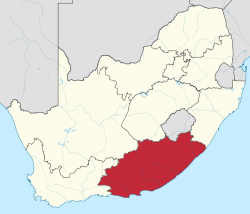Eastern Cape
|
Eastern Cape Oos-Kaap (Afrikaans) Mpuma Koloni (Xhosa) |
||
|---|---|---|
| Province of South Africa | ||
|
||
| Motto: Development through Unity | ||
 Location of the Eastern Cape in South Africa |
||
| Country | South Africa | |
| Established | 27 April 1994 | |
| Capital | Bhisho | |
| Largest city | Port Elizabeth | |
| Districts | ||
| Government | ||
| • Type | Parliamentary system | |
| • Premier | Phumulo Masualle (ANC) | |
| Area | ||
| • Total | 168,966 km2 (65,238 sq mi) | |
| Area rank | 2nd in South Africa | |
| Highest elevation | 3,019 m (9,905 ft) | |
| Lowest elevation | 0 m (0 ft) | |
| Population (2011) | ||
| • Total | 6,562,053 | |
| • Estimate (2015) | 6,916,200 | |
| • Rank | 3rd in South Africa | |
| • Density | 39/km2 (100/sq mi) | |
| • Density rank | 6th in South Africa | |
| Population groups | ||
| • Black African | 86.3% | |
| • Coloured | 8.3% | |
| • White | 4.7% | |
| • Indian or Asian | 0.4% | |
| Languages | ||
| • Xhosa | 78.8% | |
| • Afrikaans | 10.6% | |
| • English | 5.6% | |
| • Sotho | 2.5% | |
| Time zone | SAST (UTC+2) | |
| ISO 3166 code | ZA-EC | |
| Website | www.ecprov.gov.za | |
The Eastern Cape is a province of South Africa. Its capital is Bhisho, but its two largest cities are Port Elizabeth and East London. It was formed in 1994 out of the Xhosa homelands of Transkei and Ciskei, together with the eastern portion of the Cape Province. Landing place and home of the 1820 settlers, the central and eastern part of the province is the traditional home of the Xhosa people. This region is the birthplace of many prominent South African politicians, such as Nelson Mandela, Oliver Tambo, Walter Sisulu, Govan Mbeki, Raymond Mhlaba, Robert Mangaliso Sobukwe, Chris Hani, Thabo Mbeki, Steve Biko, Bantu Holomisa and Charles Coghlan.
The Eastern Cape as a South African Province came into existence in 1994 and incorporated areas from the former Xhosa homelands of the Transkei and Ciskei, together with what was previously part of the Cape Province. This resulted in several anomalies including the fact that the Province has four supreme courts (in Grahamstown, Port Elizabeth, Bhisho and Mthatha) and enclaves of KwaZulu-Natal in the province. The latter anomaly has fallen away with amendments to municipal and provincial boundaries.The province is also made of Mpondo clan, which primitively descended from Xhosa clan. Some of the Mpondo clan went to this province when they were running away from King Shaka's war. Mpondo people are more closely related to Xhosa, as they use Xhosa as their main home language.
...
Wikipedia

